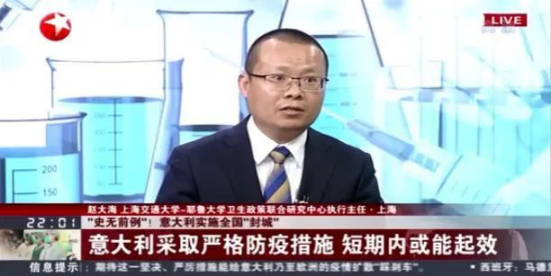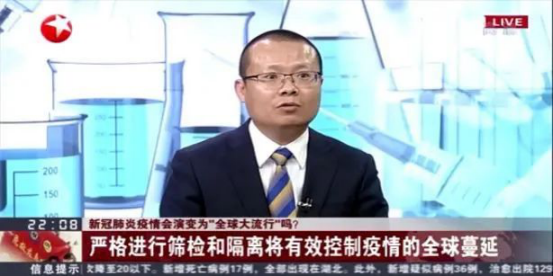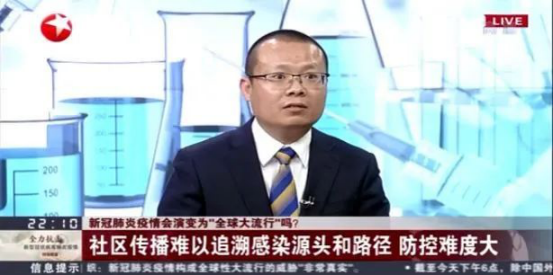
上海交通大学国际与公共事务学院博士生导师、上海交通大学-耶鲁大学卫生政策联合研究中心执行主任赵大海,自新冠肺炎疫情以来第十三次接受央视/上视直播采访。2020年3月10日21点30分,赵大海做客东方卫视演播厅,在《全力抗击新型冠状病毒肺炎疫情》节目,对意大利疫情防控和新冠肺炎全球大流行威胁等进行了解读和评论。
主持人:我们来问一下赵大海。赵大海是上海交通大学-耶鲁大学卫生政策联合研究中心执行主任。刚才我们也了解到意大利的情况,实际上是非常的严峻。那么不少的外媒用史无前例的这样一种词儿来形容意大利的情况。意大利全国来进行封城的这个举措是非常罕见。世卫组织也对意大利全国封城的做法给予了肯定,并希望这些措施,能够在未来的几天,切实的起到效果。那么制止疫情的加速的蔓延,您对意大利的这样一个封城的措施怎么看?

赵大海:好,蒋老师。首先,意大利确实采取了一个确实是史无前例的非常严格的疫情管控的措施,也就是说居民尽可能是要在居住场所,尽可能是不要离开居住场所的这种全国封城的方式。应该讲它的效果,确实会在比较短的时间之内有所显现。特别是,至少是相比较于人口流动而言的,它可以在很大程度上来限制病毒的传播。当然,如果想让效果进一步的体现出来,还得需要其他的一些配套措施,比如说对于确诊的患者要早期的治疗,对于患者的密切接触者要做到早期的隔离和早期的检测等一系列的措施的共同实施的前提下,意大利的防控效果才能最终更明显的显现出来。
主持人:是,你刚才讲了一点非常的重要,那就是患者能够得到及时的,有效的治疗。愿望是这样,但我们刚才看的那个片子,事实却很残酷,为什么,因为医疗配套的设施,包括其他的一些综合的设施,相对病人的需求来讲是严重的不足。所以从您的角度来讲意大利目前医疗的状况怎么来应对这个井喷式的这样一个病患的一些需求。
赵大海:好的。首先,对于意大利医疗系统而言,确实是遭受了一个巨大的压力。在意大利,近几年的历史上也是非常罕见的。对于未来的缓解医疗系统的压力而言,可能做的首先是将重症的患者和相对症状比较轻的患者,有一个比较好的机制进行分流,也就是说ICU的这个病房空出来留给这个重症患者。但是对于轻症的或者早期的这些患者应该通过整合其他的一些医疗机构,甚至是来重新建一些临时医院的方式来收治这些早期的患者。另外,对于意大利而言,可能还得需要国际的援助,提高ICU的救治能力。
主持人:我插一句,刚才那个小片子谈到了,比如说这个意大利,因病去世的人,这个比例是相当高的,5%。世界卫生组织统计了因新冠肺炎这个去世的人大概是3.4%,所以这样的比例很高,就刚才你讲了,一定要扩大这个ICU救治的能力。您接着说。
赵大海:是的,就是说目前,就是说ICU病房,包括这个病房的旁边都已经收治了重症患者,应该讲,在一定程度上是限制了ICU对重症患者的救治,因此确实需要国际社会,特别是欧盟的一些疫情不是特别严重的国家对意大利进行援助。
主持人:好的,我们继续请教一下赵老师,那谭德赛认为全球性的大流行已经变得非常的真实,那么,他这样的一个表态的到底意味着什么?另外呢,我们怎么能够防止这种全球性的大流行真正的到来。

赵大海:好的。首先,谭德赛讲这句话就是说全球大流行的威胁已变得非常真实。他的主要的依据,就是现在新冠肺炎已经波及到了100多个国家,他主要是通过这个波及国家的数量来论证,这个全球大流行的威胁已经是变得非常真实。对于如何来防止真正的造成全球大流行,就说对于世界上的绝大多数国家应该采取非常严格的疫情防控的措施。比如说对于一些疫情不是很严重的国家,应该以国家为单位,对于所有的外来人员进行严格的隔离措施等等。对于疫情相对比较严重的国家,也应该采取非常严格的隔离,早期发现早期治疗整非常严格的传统的传染病防控措施。如果各个国家都非常重视的话,而且措施非常得当的话,全球大流行应该是不会形成。
主持人:是,我们刚才看到,世卫组织也把这个传播的级别分为四级,最高一级就是社区传播,那么从您的研究的角度来看的话,因为我们最近听的社区传播比较多,但是从您的研究,科学的给我们定义一下什么才叫做社区传播以及根据意大利,根据这个伊朗和其他的一些疫情比较严重的国家目前的一个案例来讲的话,这些社区传播的他的一个控制难度在哪?

赵大海:首先,所谓的社区传播,主要是指在一个相对比较固定的一个区域里边,有大量的、不明来源或者说难以追溯到源头的同一类传染病患者。如果构成这种条件的话,我们就认为是社区传播。社区传播确实是整个这个传染病疫情传播的最严厉的一个阶段。它防控的真正的难点,就是说非常难以来追溯疑似患者以及患者的密切接触者。譬如说,输入患者就能按照输入找到源头。很难来找到源头,就对于整个防控而言,那很难用传统的疫情防控手段,比如说早发现早隔离早治疗的手段来进行干预。因此,在不得已的前提下,如果出现了比较有证据显现的社区传播的话,只能采取封城或者是封社区的这种办法来进行防控。
供稿者:国务学院
日期:2020年3月11日
Dahai Zhao' 13th comments on TV during the Pandemic: Italy has Become the First European Country to Lockdown, the Threat of a Global Pandemic has Become Very Real
Dahai Zhao, a doctoral supervisor of the School of International and Public Affairs of Shanghai Jiao Tong University and executive director of Shanghai Jiao Tong University-Yale University Joint Center for Health Policy have been interviewed by TV live broadcast for the 13th time since COVID-19 epidemic. At 21:30 on March 10, 2020, Zhao comment on the epidemic prevention and control of Italy and the global pandemic threat of COVID-19 pneumonia in the program "Containing COVID-19 with Full Efforts".
Anchor: Let's talk to Zhao. We have just learned that the situation in Italy is actually very serious. So many foreign media use such an unprecedented word to describe the situation in Italy. The national closure of Italy is very rare. WHO has affirmed this and hopes that these measures will be effective in the next few days. Then, to stop the outbreak, what do you think of the measures to close such a city in Italy?
Zhao: First of all, Italy has indeed adopted a very strict epidemic control measure, which is unprecedented. That is to say, residents should be in the place of residence as much as possible, and as far as possible, they should not leave the place. It should be said that its effect will indeed appear in a relatively short period of time. In particular, it can limit the spread of COVID-19 to a large extent, at least compared to the population movements. Of course, if the effect is to be further manifested, some other supporting measures are needed, such as early treatment for diagnosed patients and early isolation and early detection for close contacts. Under the premise of the joint implementation of the measures, the prevention and control effect of Italy can finally be more effective.
Anchor: What you just said is very important, that is, patients should get timely and effective treatment. The wish is like this, but the film we just watched is actually cruel. The medical facilities, including other comprehensive facilities, are seriously inadequate for the needs of patients. So from your point of view, how does the current medical condition in Italy cope with some needs of such a blowout patient?
Zhao: First of all, for the Italian medical system, there is indeed a tremendous pressure. In Italy, it is also very rare in recent history. For future stress relief in the health care system, the first thing that might be done is to have a better mechanism for triage between critically ill patients and those with relatively mild symptoms, that is to say, the ICU room is left vacant for the critically ill patient. But for those with mild or early disease, these patients should be treated by integrating other medical institutions, or even by rebuilding temporary hospitals. In addition, for Italy, international assistance may be needed to improve ICU capacity.
Anchor: The film just talked about, for example, in Italy, the proportion of people who died of illness was quite high, 5%. WHO has estimated that the number of people who die from COVID-19 is about 3.4%, so that's a very high percentage. As you said, it's important to expand the capacity of the ICU.
Zhao: Yes, at present, patients have been admitted beside to ICU, which to some extent restricts the treatment of severe patients in ICU. Therefore, the international community, especially some countries in the European Union that are not seriously affected by the epidemic, is really needed to provide assistance to Italy.
Anchor: Tedros Adhanom Ghebreyesus thinks the global pandemic has become very real, so what does he mean by such a statement? And how can we prevent such a global pandemic from actually occurring?
Zhao: First, Tedros Adhanom Ghebreyesus says the threat of a global pandemic has become very real. His main argument is that COVID-19 has now reached more than 100 countries, and he argues mainly by the number of countries affected that the threat of a global pandemic has become very real. As for how to prevent a truly global pandemic, it is said that most countries in the world should adopt very strict epidemic control measures. For example, for some countries where the epidemic situation is not very serious, strict quarantine measures should be carried out for all foreigners by country. For countries with a relatively severe epidemic, strict quarantine should also be adopted, and strict traditional measures for the prevention and control of infectious diseases should be adopted for early detection and early treatment. If countries take it seriously and do it properly, a pandemic should not occur.
Anchor: Yes, we just saw that WHO divides the level of communication into four levels, and the highest level is community communication. From your perspective, scientifically define what we call community communication. According to current case of Italy, Iran and some other countries with severe outbreaks, how difficult is it to control these communities?
Zhao: First of all, community transmission mainly refers to the same type of infectious diseases in a relatively fixed area with a large number of unknown sources or difficult to trace to the source. If such a condition is constituted, we consider it to be community communication. Community transmission is indeed the most severe stage in the spread of the entire epidemic. The real difficulty of its prevention and control means that it is very difficult to trace the suspected patient and the patient's close contacts. As far as the whole prevention and control is concerned, it is difficult to use traditional means of epidemic prevention and control, such as early detection, early isolation, and early treatment. Therefore, under the premise of last resort, if there is more evidence of community transmission, only the method of closing the city or closing the community can be adopted for prevention and control.
Contributor: SIPA, SJTU
Date: March 11, 2020

